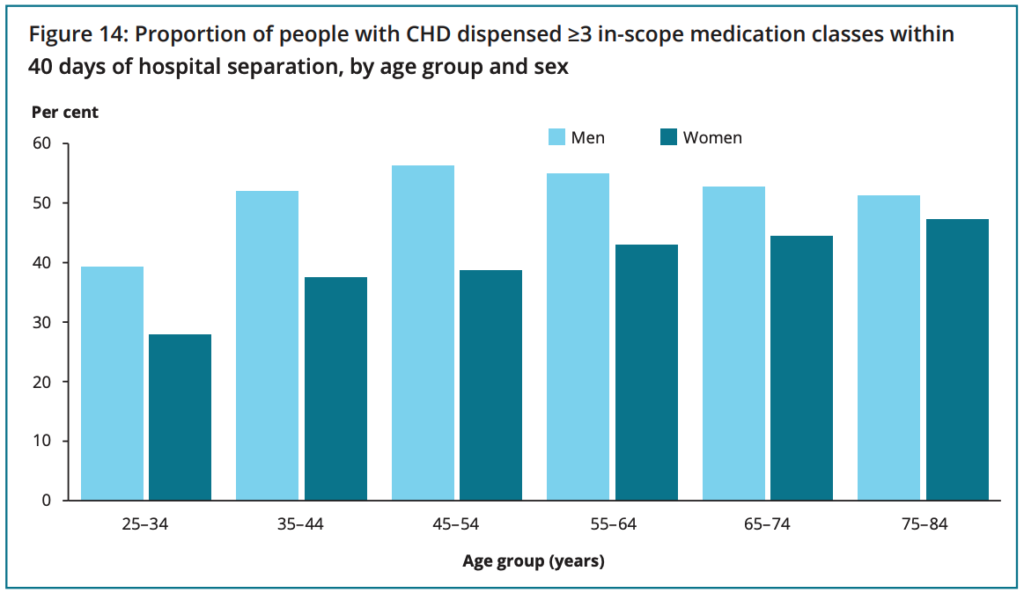After being hospitalised for heart disease, younger people and women are less likely to be prescribed the recommended medications.
Young women are significantly less likely to be dispensed three or more heart medications after being admitted to hospital for coronary heart disease, new data shows.
An Australian Institute of Health and Welfare report has also found that only 40% of younger women were still taking heart medication one year after being hospitalised.
The AIHW data on medication use for secondary prevention after coronary heart disease hospitalisations includes 67,800 people admitted to hospital for coronary heart disease in the 12 months to July 2017.
Across all age groups, women were significantly less likely to be dispensed three or more heart medications on discharge, including statins, beta blocking agents, antiplatelet agents and agents acting on the renin-angiotensin system. The difference was greatest in people aged 45-54, at 38% of women and 56% of men.

Younger women with acute coronary syndrome also had lower levels of “persistence” – the continuation of medication for one year after hospitalisation. Women aged 35-44 had 40% persistence compared to 47% of men.
However, there was little difference in persistence between men and women across all medications or in other age groups.
The report found that compared to men, a higher proportion of women accessed all types of health services, had higher number of GP visits and greater continuity of care.
One year after leaving hospital, 74% of all people with coronary heart disease were still taking heart medication, and they were more likely to do so if they had more severe heart disease, were older or if they regularly saw their GP.
In people aged over 75, 38% of women did not see a GP in the following year compared to 16% of men.
“Indigenous Australians were significantly more likely to be dispensed beta blocking agents than non-Indigenous Australians (52% and 48%, respectively) and more likely to be dispensed 3 or more in-scope medication classes within 40 days of discharge (53% and 50%, respectively),” the report said.
While 61% of people admitted for acute coronary syndrome saw a GP in the week after admission, and 97% of people saw a GP in the following year, only 4% of people had a medication review in that year.
Patients who had already been taking heart medication before being admitted to hospital were significantly more likely to be dispensed medication after their admission.
RACGP President Adjunct Professor Karen Price said the data highlighted the need for patients to have coordinated follow-up care with GPs after being admitted to hospital.
“Because there are steps people can take to reduce their risk of another cardiac event, including taking cardiovascular medicines, and nobody should be missing out on this care – particularly those who are more vulnerable and at-risk.
Professor Price said the AIHW analysis showed that people who regularly saw their GP were more likely to take medications one year after leaving hospital.
“We are continuing to call for the government to provide funding for patients to see their GP within seven days of an unplanned hospital admission or emergency department presentation – this will reduce re-admissions and help ensure patients have the best possible outcomes, including those with coronary heart disease.”
AIHW spokesperson Miriam Lum On said people who had been to hospital for acute coronary syndrome were at higher risk of having another cardiovascular event in the future.
“However, there are steps that they can take to reduce this risk, including taking cardiovascular medicines. Australian clinical guidelines recommend that people who survive an ACS event are prescribed a multidrug regime that includes 4 medication classes.”
Ms Lum On said further work was needed to identify why some subgroups were less likely to access preventive medications or continue taking medications after being in hospital.
“The AIHW is working with closely with our expert advisory group on further analysis examining the relationship between medication adherence and the risk of subsequent hospitalisations and death.”
Another AIHW report on the incidence of stroke and acute coronary syndrome found that every day in 2018, about 110 Australians had a heart attack for the first time and 79 had a stroke.
AIHW: Estimating the incidence of stroke and acute coronary syndrome, online 3 November


